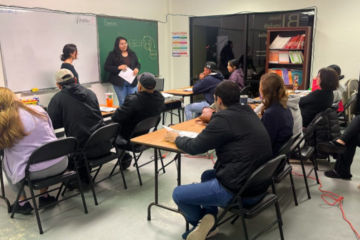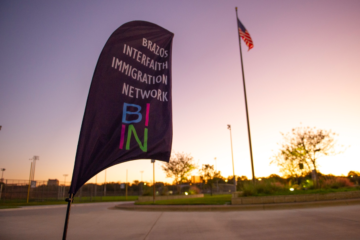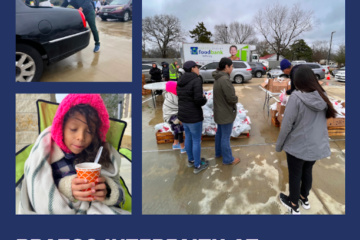It was January 2013. Mary Campbell was looking for a good way to help her A&M undergrads understand the relevance of readings and lectures about race and ethnicity in American society. As an associate professor of sociology, Mary knew she wanted her students to have personal contact with people from other backgrounds, to talk and work with them in ways that would help them understand others’ experiences and question their own assumptions. Being new to the Brazos Valley, Mary asked her colleague, Nancy Plankey-Videla, for ideas of local non-profits where students might be welcome as volunteers. Nancy suggested that she consider Brazos Interfaith Immigration Network, and the rest, as they say, was history.
Mary began volunteering with BIIN, and to this day, both she and her husband, Jeremy Brett, help teach BIIN’s citizenship classes. A steady stream of Mary’s students, joining those of Nancy Plankey-Videla and other local faculty, have volunteered with BIIN classes and programs over the years. In 2016, Mary was invited to join the BIIN Board, and by 2018, she had been elected President. When it became clear that there were board members willing to lead in 2020 (but not 2019), Mary agreed to serve as President for a second year, to keep the momentum going. Mary led the organization through strategic planning and staff expansions in 2019-20, as well as through the turmoil and pivoting occasioned by the early months of the coronavirus pandemic. As Mary passed the President’s baton to Jackie Zimmerman in August 2020 and is stepping down from the board, the time seemed right to say thank you to Mary Campbell and to take stock of what BIIN has accomplished in the past two years.
You may wonder: what exactly is the role of a board in a non-profit organization? As Mary explains it, “The board’s job is to make sure that the organization is healthy: to keep an eye on the finances, for example, and make sure that the money coming in is enough to cover our goals for the year. And to keep an eye on how the programs are running, to identify if there are problems or new needs that have emerged that we’re not addressing yet. So ideally, the board’s job is to think about: What is our mission? What should we be doing? Are we doing that? And can we do it better?”
Looking back on what BIIN has accomplished in the past two years, Mary points to the organization’s work in several areas:
BIIN has invested in resources needed to make specific programs more effective. For example, purchasing a textbook series that could be used in both English Conversation Partners and English for Parents classes made it easier for long-term volunteers to lead these programs, and for students to proceed at their own pace, while attending as many classes per week as their schedules allowed.
BIIN has implemented ways of recognizing volunteers’ contributions to BIIN, through systems such as Volgistics and the volunteer “SWAG” program, and events such as the celebration of volunteers held in September 2019.
BIIN has offered new workshops on topics of interest to local residents, such as DACA renewals or updates on naturalization procedures, responding to the continued need for legal guidance offered in Spanish and at no cost to participants.
BIIN has very successfully led a campaign, through the BIIN CARES Fund, to provide direct economic relief to local immigrant families impacted by the pandemic.
For Mary and many who have worked with her, the BIIN CARES Fund is particularly noteworthy. BIIN has historically offered free classes and services to anyone in need, but not direct economic assistance. However, in the spring of 2020, given the evident impact of the pandemic and the fact that people who pay taxes to local, state and federal governments were being explicitly excluded from the federal CARES Act solely on the basis of their immigration status, the BIIN Board wagered that many in our community would see this policy as inherently unfair. BIIN’s initial goal was $50,000 but by July 2020, the campaign had raised over $62,000, to help pay rent and utilities bills for local immigrant families impacted by the pandemic and economic downturn. As Mary explained, “I felt like we were taking a big leap there. And the fact that we pulled it off so successfully, I was very excited about that. It’s also a great example of one of the most important things BIIN does, which is: we should be always asking ourselves, ‘What is the new need? What has come up that we are not helping with?’”
Board Treasurer Rich Woodward agrees, “BIIN Cares was one of the most important things that BIIN has done.” He also credits Mary for being instrumental to the success of this initiative: “Mary was in the middle of it, writing all the checks and keeping everything in order. We needed someone who was willing and able to do that. Even though as President she could have said, ‘I’ve got enough on my plate,’ she took it on and made it happen.”
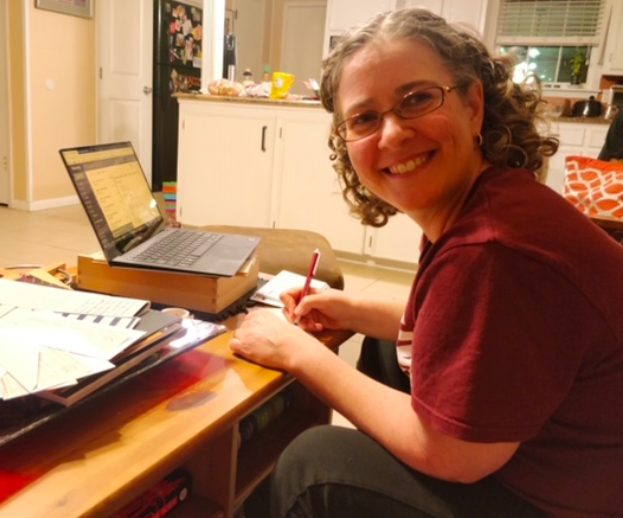
BIIN Director Jaimi Washburn also underscored the role that Mary played in ensuring the success of BIIN CARES: “As soon as the discussion of stimulus checks hit the news, Mary developed the BIIN CARES idea. After recruiting a subcommittee to spearhead the project, she framed and presented an argument for why BIIN should offer direct financial assistance to low-income immigrants affected by the pandemic to the board. She set a lofty goal to raise $50,000. Her letter to BIIN volunteers and donors explained why she was so passionate about giving her own stimulus check to struggling local immigrants and asked them to join her,” recalled Jaimi. “To my surprise, her vision came to fruition with the organization raising over $60,000 for direct financial assistance to those that did not qualify for a stimulus check. She wrote, signed, and mailed over 150 checks and kept accounting records for the program. Without her vision and hard work, immigrants in our community would be struggling even more during these difficult times.”
Mary is quick to credit others for BIIN’s achievements. She points to the deep and long-term commitment of her fellow board members, the contributions of many volunteers, and the skills of the organization’s paid staff. In Mary’s view, all are essential to BIIN’s ability to pursue its mission. “We have a lot of people who care deeply about the organization, are very invested in its success and will sacrifice a tremendous amount for that,” observed Mary. “But they work a lot of hours, and they can’t commit to a big leadership role. That is part of why I have wanted to transition to more staff running things day to day.”
Mary is particularly grateful for the professionalism of Director Jaimi Washburn, who was hired in early 2018, shortly before Mary’s term as Board President began. For an organization like BIIN that relies on volunteers to carry out its programs, having staff who could create systems and build consistency was fundamental. As Mary observed, small non-profits need “somebody who is willing to take charge, and keep everything moving forward. We have all these volunteers who have lots that they want to get done, but we all [board members and volunteers] work full-time jobs, separate from BIIN. And so, if there isn’t somebody emailing us, saying, ‘Hey, where’s the thing you promised me?’, it won’t get done. But since we have Jaimi and she keeps all those things moving forward, things are done.”
For a non-profit organization to be effective in pursuing its mission, the entire board also needs to be mobilized and inspired to do its best work. Several people who have worked closely with Mary shared their perspective on what made her leadership of BIIN’s board so effective.
Board Secretary Zuleika Carrasco-Martinez observed that Mary demonstrated both “structure” and “flexibility” – two traits that are equally necessary to lead a non-profit board. “She brought compassion and a willingness to try things that would be brought up,” said Zuleika. “Rarely do you hear a ‘no’ coming from Mary. Instead, she says, ‘Let’s investigate and see if it works.’”
Board member Carol Goldsmith also felt that Mary was “an excellent leader” for several specific reasons: “She keeps our mission clearly in mind when asking for input and making decisions. She solicits and welcomes everyone’s input and then synthesizes what she’s heard, summarizes that, and suggests how to move forward. She is positive and seeks how to turn good ideas into action.”
BIIN Director Jaimi Washburn concurred, noting, “Mary is an incredible listener and communicates her vision and passion for BIIN’s work with conviction. She is always quick to look at the lessons learned in the past, yet she also seeks new ideas, approaches, and solutions to current problems or issues. She was able to quickly lead the organization to make changes, was always flexible and willing to compromise when needed, and was decisive when required. Mary is a thoughtful servant leader in all that she does.”
Board member Rich Woodward emphasized the ways that Mary has worked with the staff, and in particular, Director Jaimi Washburn, to keep the organization moving forward: “Mary’s most important work has happened behind the scenes, working with Jaimi to ensure that the organization is professional and effective,” Rich noted. “Under her leadership, BIIN has taken huge steps towards becoming a permanent voice for the immigrant community of Brazos County.”
As a staff person, Jaimi has also appreciated Mary’s readiness to do what needs to be done, well beyond board meetings. “Mary was always willing to roll up her sleeves and jump in to help with any behind-the-scenes work,” she observed. “For example, at the annual fundraising dinner [in 2019], she helped plan every step of the dinner including the meal, the drinks, the message, the program, the setup and clean up, etc. She also helped set up for the dinner, troubleshoot AV problems, and stayed for the cleanup. Mary didn’t just lead our team as board chair — she was a teammate just like everyone else.”
For all of these reasons, and many more, BIIN has been fortunate to operate for two years under the leadership of Mary Campbell. On behalf of the board, the staff, the volunteers and clients, we say THANK YOU to Mary Campbell! Thank you for all that you have given to BIIN and the myriad ways in which you have helped the organization pursue its mission.
Although Mary is stepping down from the board, she plans to continue to work with Jeremy Brett, Carol Goldsmith and others, to teach the English citizenship classes, and to support BIIN’s work in the community in other ways. In other words, we are not saying good-bye, but hasta la vista, hasta pronto, y gracias por todo, Mary!
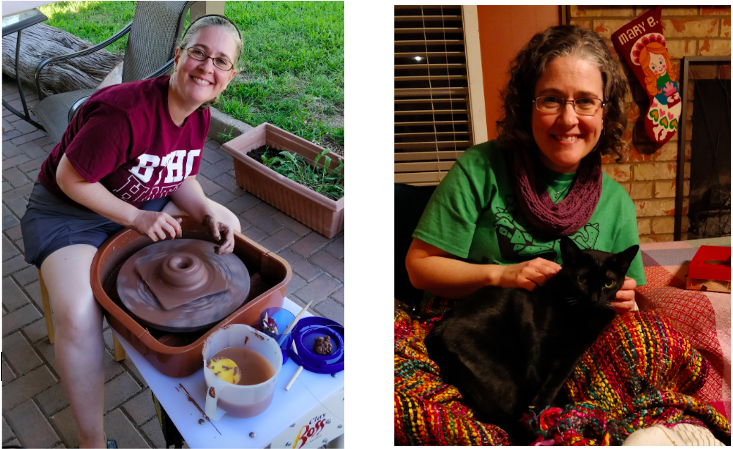
We hope that in the coming months, Mary will find time to indulge in some of her favorite pastimes, including throwing pots, baking, and hanging out with friends, feline or otherwise.
